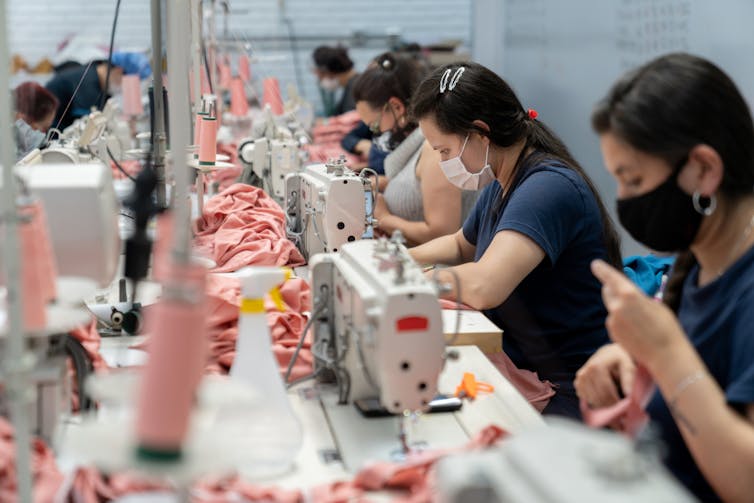
“We haven’t had a full night’s sleep since our son was born eight years ago,” said Mrs. B, pointing to her son’s dry, red and itchy skin.
Her son has had eczema his entire life. Also known as atopic dermatitis, this chronic skin disease affects about 1 in 5 children in the industrialized world. Some studies have found rates of eczema in developing nations to be over thirtyfold lower compared with industrialized nations.
However, rates of eczema didn’t spike with the Industrial Revolution, which began around 1760. Instead, eczema in countries such as the U.S., Finland and other countries started rapidly rising around 1970.
What caused eczema rates to spike?
I am an allergist and immunologist working with a team of researchers to study trends in U.S. eczema rates. Scientists know that factors such as diets rich in processed foods as well as exposure to specific detergents and chemicals increase the risk of developing eczema. Living near factories, major roadways or wildfires increase the risk of developing eczema. Environmental exposures may also come from inside the house through paint, plastics, cigarette smoke or synthetic fabrics such as spandex, nylon and polyester.
While researchers have paid a lot of attention to genetics, the best predictor of whether a child will develop eczema isn’t in their genes but the environment they lived in for their first few years of life.
Table of Contents
There’s something in the air
To figure out what environmental changes may have caused a spike in eczema in the U.S., we began by looking for potential eczema hot spots – places with eczema rates that were much higher than the national average. Then we looked at databases from the U.S. Environmental Protection Agency to see which chemicals were most common in those areas.
For eczema, along with the allergic diseases that routinely develop with it – peanut allergy and asthma – two chemical classes leaped off the page: diisocyanates and xylene.
Diisocyanates were first manufactured in the U.S. around 1970 for the production of spandex, nonlatex foam, paint and polyurethane. The manufacture of xylene also increased around that time, alongside an increase in the production of polyester and other materials.

andresr/E+ via Getty Images
The chemically active portion of the diisocyanates and xylene molecules are also found in cigarette smoke and wildfires. After 1975, when all new cars became outfitted with a new technology that converted exhaust gas to less toxic chemicals, isocyanate and xylene both became components of automobile exhaust.
Research has found that exposing mice to isocyanates and xylene can directly cause eczema, itch and inflammation by increasing the activity of receptors involved in itch, pain and temperature sensation. These receptors are also more active in mice placed on unhealthy diets. How directly exposing mice to these toxins compares to the typical levels of exposure in people is still unclear.
How and why might these chemicals be linked to rising rates of eczema?
Skin microbiome and pollution
Every person is coated with millions of microorganisms that live on the skin, collectively referred to as the skin microbiome. While researchers don’t know everything about how friendly bacteria help the skin, we do know that people need these organisms to produce certain types of lipids, or oils, that keep the skin sealed from the environment and stave off infection.
You’ve probably seen moisturizers and other skin products containing ceramides, a group of lipids that play an important role in protecting the skin. The amount of ceramides and related compounds on a child’s skin during their first few weeks of life is a consistent and significant predictor of whether they will go on to develop eczema. The less ceramides they have on their skin, the more likely they’ll develop eczema.

FluxFactory/E+ via Getty Images
To see which toxins could prevent production of the beneficial lipids that prevent eczema, my team and I used skin bacteria as canaries in the coal mine. In the lab, we exposed bacteria that directly make ceramides (such as Roseomonas mucosa), bacteria that help the body make its own ceramides (such as Staphylococcus epidermidis) and bacteria that make other beneficial lipids (such as Staphylococcus cohnii) to isocyanates and xylene. We made sure to expose the bacteria to levels of these chemicals that are similar to what people might be exposed to in the real world, such as the standard levels released from a factory or the fumes of polyurethane glue from a hardware store.
We found that exposing these bacteria to isocyanates or xylene led them to stop making ceramides and instead make amino acids such as lysine. Lysine helps protect the bacteria from the harms of the toxins but doesn’t provide the health benefits of ceramides.
We then evaluated how bed sheets manufactured using isocyanates or xylene affect the skin’s bacteria. We found that harmful bacteria such as Staphylococcus aureus proliferated on nylon, spandex and polyester but could not survive on cotton or bamboo. Bacteria that help keep skin healthy could live on any fabric, but, just as with air pollution, the amount of beneficial lipids they made dropped to less than half the levels made when grown on fabrics like cotton.
Addressing pollution’s effects on skin
What can be done about the connection between pollution and eczema?
Detectors capable of sensing low levels of isocyanate or xylene could help track pollutants and predict eczema flare-ups across a community. Better detectors can also help researchers identify air filtration systems that can scrub these chemicals from the environment. Within the U.S., people can use the EPA Toxics Tracker to look up which pollutants are most common near their home.
In the meantime, improving your microbial balance may require avoiding products that limit the growth of healthy skin bacteria. This may include certain skin care products, detergents and cleansers. Particularly for kids under 4, avoiding cigarette smoke, synthetic fabrics, nonlatex foams, polyurethanes and some paints may be advised.
Replacing bacteria that has been overly exposed to these chemicals may also help. For example, my research has shown that applying Roseomonas mucosa, a ceramide-producing bacterium that lives on healthy skin, can lead to a monthslong reduction in typical eczema symptoms compared with placebo. Researchers are also studying other potential probiotic treatments for eczema.
Evaluating the environmental causes of diseases that have become increasingly common in an increasingly industrialized world can help protect children from chemical triggers of conditions such as eczema. I believe that it may one day allow us to get back to a time when these diseases were uncommon.
![]()
Ian Myles receives funding from the Department of Intramural Research at the National Institute of Allergy and Infectious Diseases. He is the author of, and receives royalties for, the book GATTACA Has Fallen: How population genetics failed the populace. Although he is the co-discoverer of Roseomonas mucosa RSM2015 for eczema, he has donated the patent to the public and has no current conflict of interest for its sales.























